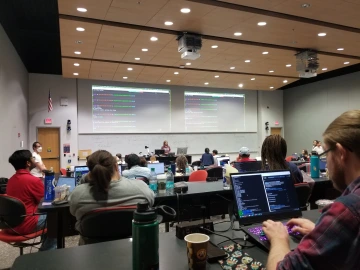U of A Students Dive into Software and Data Carpentries Workshops

The Data Science Institute and U of A DataLab, in partnership with UA Libraries and the BIO5 Institute, hosted Software and Data Carpentries workshops on March 22 and 23, 2025. Led in part by Uwe Hilgert, Ph.D., Associate Research Professor and Director of Industry Relations, Workforce Development & STEM Training, the workshops recognized the 10th anniversary of providing grad and undergrad students, postdoc researchers, staff, and faculty with the chance to develop technical skills that are crucial for success in research settings. The hands-on sessions focused on teaching foundational tools: the command line, version control with Git and GitHub, and Python for data analysis.
The workshops included 46 participants on Saturday and 24 on Sunday with many individual instructor support. With the content structured for those new to coding and research software, the sessions helped demystify tools that are often barriers for students entering labs or working on data-driven research projects.
The preparation for the workshop was equally important as the workshops. The instructors—mainly graduate students and staff—met several times to align their teaching approach and ensure consistency. The planning helped the team create a cohesive and supportive environment where they felt learning could take place.

Feedback and reflection were also central to the workshop’s design. The U of A DataLab uses comments from participants to improve future sessions. Instructors like Megh Krishnaswamy emphasized how the experience not only benefited the attendees but also challenged them as instructors to reinforce their own understanding and teaching strategies. Similarly, Sarah Roberts noted the enthusiasm and progress of the group as they worked through Git and Python exercises.
Instructors worked closely with attendees throughout the weekend. They encouraged independent thinking first, then moved into collaborative problem-solving. The workshops remained engaging and interactive, even as participants encountered new and sometimes difficult concepts. The instructor, Michele Cosi, introduced strategies such as gamification and group discussion that helped the attendees to see the practical value of the tools being introduced.
Students gained confidence in skills that are often expected in labs and research groups but are not always taught in formal courses. From managing code in GitHub to understanding the logic behind scripts in Jupyter Notebooks, participants left with a stronger foundation to contribute to their academic work.
The workshops demonstrate the U of A’s commitment to preparing students for real-world research and providing them with tools they can use immediately and in the future.

